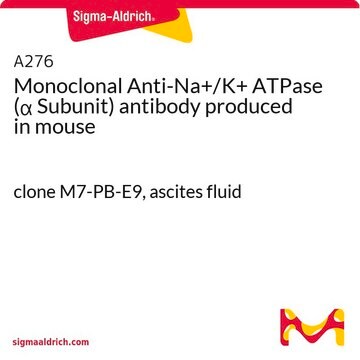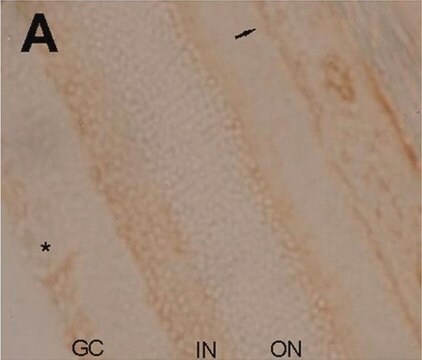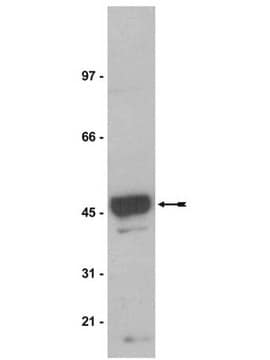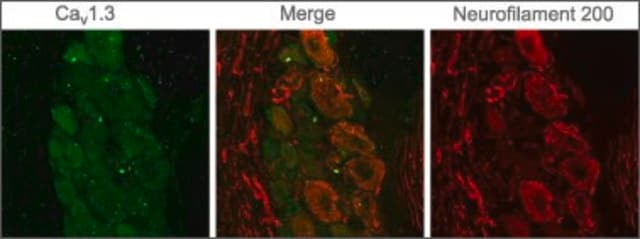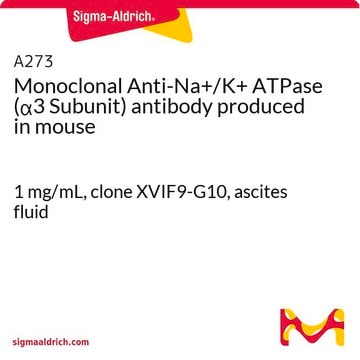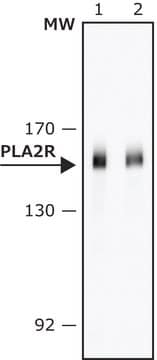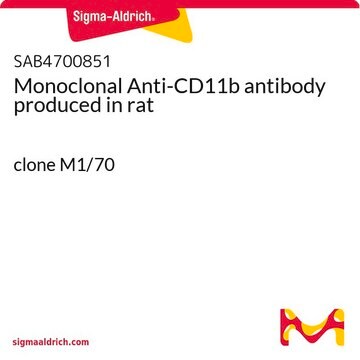A275
Monoclonal Anti-Na+/K+ ATPase (α1 Subunit) antibody produced in mouse
clone 9A-5, ascites fluid
Sign Into View Organizational & Contract Pricing
All Photos(1)
About This Item
Recommended Products
biological source
mouse
Quality Level
conjugate
unconjugated
antibody form
ascites fluid
antibody product type
primary antibodies
clone
9A-5, monoclonal
mol wt
antigen ~110 kDa
species reactivity
rat, human, canine, avian
technique(s)
immunohistochemistry (frozen sections): 1:1,000
indirect ELISA: suitable
isotype
IgG1
UniProt accession no.
shipped in
dry ice
storage temp.
−20°C
target post-translational modification
unmodified
Gene Information
human ... ATP1A1(476)
rat ... Atp1a1(24211)
General description
Epitope mapping studies indicate the antibody binds within the intracellular region at or near Asp-369 of the α subunit. Staining is consistent with the plasma membrane localization of Na+/K+ ATPase.
Mouse Monoclonal Anti-Na+/K+ ATPase (α1 Subunit) antibody localizes the Na+/ K+ ATPase α1 subunit in human, canine, rat and avian tissues.
Na+/K+ transporting ATPase subunit α1 is an ion transport pump critical for maintaining the gradient of Na and K ions across the plasma membrane.
The gene coding Na+,K+-ATPase is mapped to human chromosome 1p13.1, which is a plasma membrane ion transporter. It is ubiquitously expressed in all animals. The α subunit of the protein consists of 10 transmembrane helices, and three cytoplasmic domains A, N and P that serve as actuator, in nucleotide-binding and for phosphorylation, respectively.
Immunogen
rat kidney Na+/K+ ATPase.
Application
Monoclonal Anti-Na+/K+ ATPase (α1 Subunit) antibody produced in mouse has been used in immunohistochemistry.
Mouse Monoclonal Anti-Na+/K+ ATPase (α1 Subunit) antibody has been used for immunohistochemical assays. It has also been used for immunolabeling assays to quantify the expression of proteins involved in cellular ion transport. Furthermore, the product is suitable for use in indirect ELISA.
Biochem/physiol Actions
Na+,K+-ATPase facilitates the transport of Na+ and K+ ions across plasma membrane in an ATP-dependent manner. Therefore, it is responsible for maintaining ion homeostasis across the cell and controls cellular excitability in electrically active tissues. The Na+ potential established by Na+,K+-ATPase is required for the function of secondary active transporters. Variation in the gene mostly results in protein function alteration, otherwise in some cases its stability, expression or plasma membrane targeting property is affected. Mutation in the gene is known to cause a number of disease conditions including Familial Hemiplegic Migraine type 2, Rapid-onset Dystonia Parkinsonism and Alternating Hemiplegia of Childhood. Na+,K+-ATPase serves as a receptor for cardiotonic steroids, that play a vital role in triggering proinflammatory cytokine production, in chronic inflammatory diseases, such as atherosclerosis.
Physical form
Solution in phosphate buffered saline containing 0.05% sodium azide.
Disclaimer
Unless otherwise stated in our catalog or other company documentation accompanying the product(s), our products are intended for research use only and are not to be used for any other purpose, which includes but is not limited to, unauthorized commercial uses, in vitro diagnostic uses, ex vivo or in vivo therapeutic uses or any type of consumption or application to humans or animals.
Not finding the right product?
Try our Product Selector Tool.
Storage Class Code
10 - Combustible liquids
WGK
WGK 1
Flash Point(F)
Not applicable
Flash Point(C)
Not applicable
Personal Protective Equipment
dust mask type N95 (US), Eyeshields, Gloves
Choose from one of the most recent versions:
Already Own This Product?
Find documentation for the products that you have recently purchased in the Document Library.
Cardiotonic Steroids Stimulate Macrophage Inflammatory Responses Through a Pathway Involving CD36, TLR4, and Na/K-ATPase
Chen Y, et al.
Arteriosclerosis, Thrombosis, and Vascular Biology (2017)
Genome-Wide Linkage Analysis of Systolic and Diastolic Blood Pressure
Rice T, et al.
Circulation, 102(16), 1956-1963 (2000)
Disruption of Ankyrin B and Caveolin-1 Interaction Sites Alters Na+,K+-ATPase Membrane Diffusion.
Junghans C, et al.
Biophysical Journal, 113(10), 2249-2260 (2017)
Agrin Regulation of α3 Sodium-Potassium ATPase Activity Modulates Cardiac Myocyte Contraction.
Hilgenberg LG, et al.
The Journal of Biological Chemistry, 284(25), 16956-16965 (2009)
Lutz G W Hilgenberg et al.
The Journal of biological chemistry, 284(25), 16956-16965 (2009-04-21)
Drugs that inhibit Na,K-ATPases, such as digoxin and ouabain, alter cardiac myocyte contractility. We recently demonstrated that agrin, a protein first identified at the vertebrate neuromuscular junction, binds to and regulates the activity of alpha3 subunit-containing isoforms of the Na,K-ATPase
Our team of scientists has experience in all areas of research including Life Science, Material Science, Chemical Synthesis, Chromatography, Analytical and many others.
Contact Technical Service